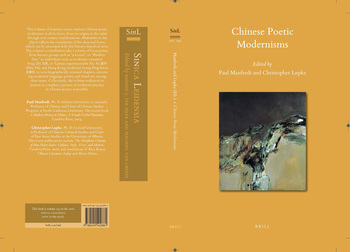This decommissioned ERA site remains active temporarily to support our final migration steps to https://ualberta.scholaris.ca, ERA's new home. All new collections and items, including Spring 2025 theses, are at that site. For assistance, please contact erahelp@ualberta.ca.

- 163 views
- 333 downloads
National Myth and Global Aesthetics: Reading Yeats alongside Chinese Poetic Modernism, pp. 210-234.
-
Chinese Poetic Modernisms, edited by Paul Manfredi and Christopher Lupke. Leiden and Boston: Brill Press.
-
- Author(s) / Creator(s)
-
One of the conundrums of modern Chinese literary studies is how to navigate the tortuous road between the particular cultural heritage from which it arises, the global phenomena of such trends as modernism, and the individual creative voice. Some adopt the strategy that indigenous cultures and westernization are mutually exclusive. Others emphasize the need to view Chinese modernism as part of a global trend in which cultural and national specificities are at best superficial, cosmetic, and incidental. In carrying out such discussions, scholars in the first camp tend to eschew comparative discussions of Chinese and Western authors. Scholars who are more internationalist in their approach embrace such comparisons. Underlying the overarching argument is the subtle, or sometimes not so subtle, attitude that those who readily adopt from the west are not authentically Chinese, and that those who tap their own tradition for creative inspiration must be antagonistic to modernism. In this essay, by providing discussions of William Butler Yeats, Wu Xinghua, Luo Fu, and Xiao Kaiyu, I advance the view that it is precisely the ability to mine the native landscape, transforming it into the rejuvenated imagery of a modern form, that makes contemporary Chinese poets modernist in style and outlook. By featuring Yeats, I suggest that it is not only Asian authors who bridle against the converging trends of modernization. Western poets such as Yeats, who in his lifetime saw himself as on the margin only to become a leading influence in global modernism, were participants in a pitched battle to maintain and resurrect the myths and narratives of their own nation. Yeats’s imagery is a rich amalgam of Biblical, classical, and local legend that is dialectically fused into disciplined, modern verse structure. Poems of Wu Xinghua such as “Xi Shi” bespeak the multilayered and multivalent sentiments of the modern author in China. Luo Fu’s long poem “Driftwood” is the most extended, and yet carefully wrought, example of the modern sensibility of exile in Chinese literature. Xiao Kaiyu's "On the Outskirts of Xi'an" is written like a modern "fu" rhapsody, a catalog of catastrophe. The picture that develops is one of complicated, even conflicted, feelings toward the modern predicament that are best articulated through a hybrid style that does not forswear their own past but is still receptive to the innovations as well as circumstances and conditions of a modern, global social milieu. Their situations were similar, their grievances shared, their thoughts resound with a dose of affinity, and they all possess a desire to express themselves in the somewhat controlled linguistic idiom of verse rather than a more expansive narrative mode. My goal is not to provide a taxonomy of national myth but to illustrate how echoes of Yeats work, preoccupations, and methods of resolving his troubles in writing have a modern kinship with contemporary Chinese poets.
-
- Date created
- 2019-01-15
-
- Subjects / Keywords
-
- Type of Item
- Chapter